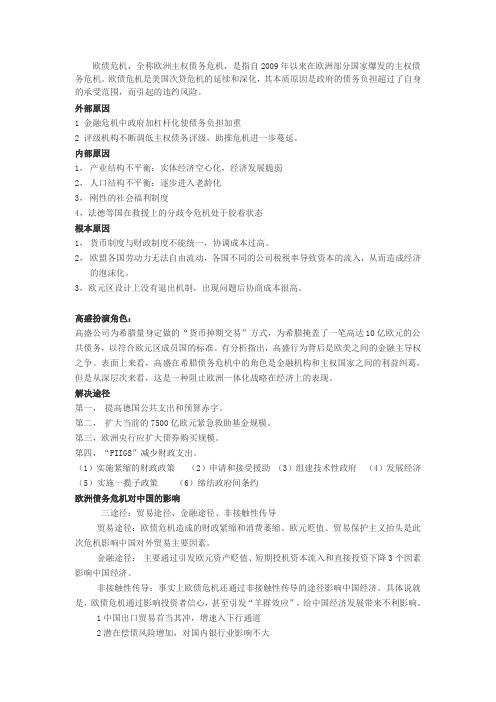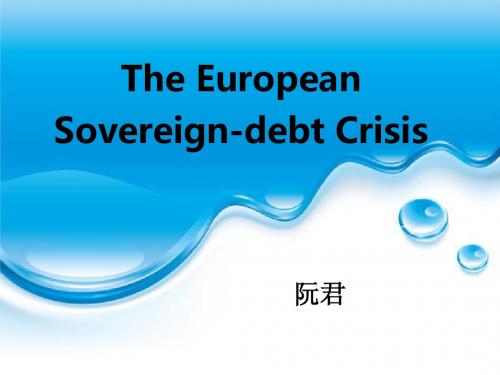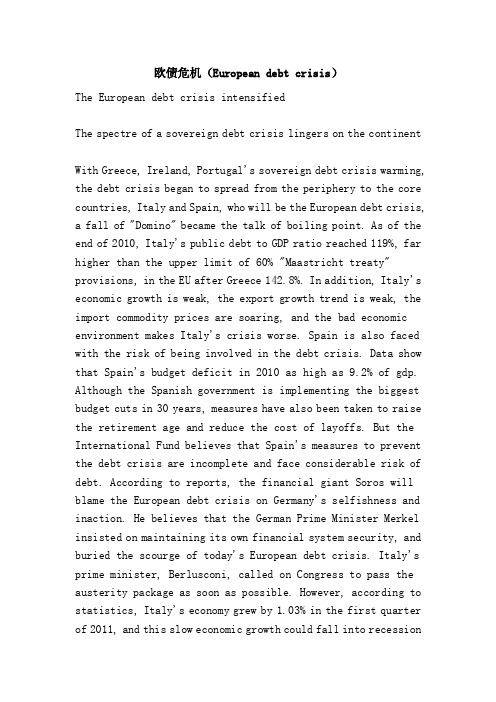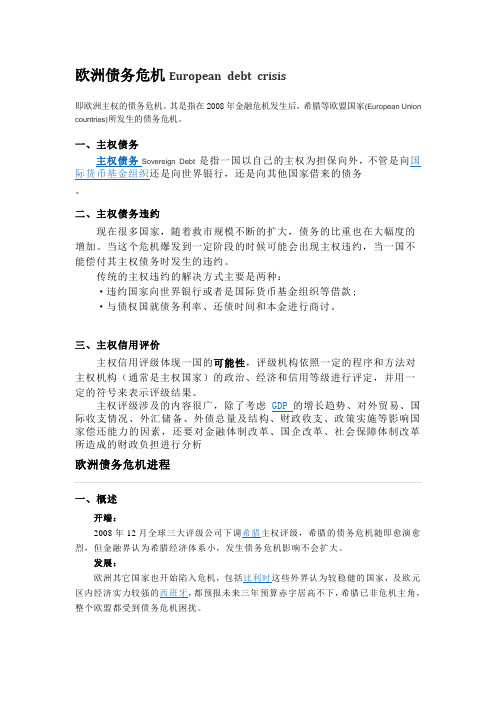European sovereign-debt crisis欧债危机
欧债危机

欧债危机,全称欧洲主权债务危机,是指自2009年以来在欧洲部分国家爆发的主权债务危机。
欧债危机是美国次贷危机的延续和深化,其本质原因是政府的债务负担超过了自身的承受范围,而引起的违约风险。
外部原因1 金融危机中政府加杠杆化使债务负担加重2 评级机构不断调低主权债务评级,助推危机进一步蔓延。
内部原因1,产业结构不平衡:实体经济空心化,经济发展脆弱2,人口结构不平衡:逐步进入老龄化3,刚性的社会福利制度4,法德等国在救援上的分歧令危机处于胶着状态根本原因1,货币制度与财政制度不能统一,协调成本过高。
2,欧盟各国劳动力无法自由流动,各国不同的公司税税率导致资本的流入,从而造成经济的泡沫化。
3,欧元区设计上没有退出机制,出现问题后协商成本很高。
高盛扮演角色:高盛公司为希腊量身定做的“货币掉期交易”方式,为希腊掩盖了一笔高达10亿欧元的公共债务,以符合欧元区成员国的标准。
有分析指出,高盛行为背后是欧美之间的金融主导权之争。
表面上来看,高盛在希腊债务危机中的角色是金融机构和主权国家之间的利益纠葛,但是从深层次来看,这是一种阻止欧洲一体化战略在经济上的表现。
解决途径第一,提高德国公共支出和预算赤字。
第二,扩大当前的7500亿欧元紧急救助基金规模。
第三,欧洲央行应扩大债券购买规模。
第四,“PIIGS”减少财政支出。
(1)实施紧缩的财政政策(2)申请和接受援助(3)组建技术性政府(4)发展经济(5)实施一揽子政策(6)缔结政府间条约欧洲债务危机对中国的影响三途径:贸易途径、金融途径、非接触性传导贸易途径:欧债危机造成的财政紧缩和消费萎缩、欧元贬值、贸易保护主义抬头是此次危机影响中国对外贸易主要因素。
金融途径:主要通过引发欧元资产贬值、短期投机资本流入和直接投资下降3个因素影响中国经济。
非接触性传导:事实上欧债危机还通过非接触性传导的途径影响中国经济。
具体说就是,欧债危机通过影响投资者信心,甚至引发“羊群效应”,给中国经济发展带来不利影响。
欧洲主权债务危机英文课件-PPT精品文档

Ask EU to recognize China’s Market Economy Country Status and loosen the hightech products export to China ?
news.xinhuanet/world/2019-10/28/c_111131389.htm
1、What’s European Sovereign Debt Crisis ? (the definitions of 2 terms)
A sovereign default is the failure or refusal of the government of a sovereign state to pay back its debt in full. It may be accompanied by a formal declaration of a government not to pay , or only partially pay its debts. If potential lenders or bond purchasers begin to suspect that a government may fail to pay back its debt, they may demand a high interest rate in compensation for the risk of default. A dramatic rise in the interest rate faced by a government due to fear that it will fail to honor its debt is sometimes called a sovereign debt crisis.
欧债危机

欧盟成员国财 政部长达成了 一项总额高达 7500亿欧元的 亿欧元的 稳定机制, 稳定机制,避 免危机蔓延。 免危机蔓延。
国际援助
为救助陷入债务危机困境的希腊, 为救助陷入债务危机困境的希腊, 欧元区国家和国际货币基金组织(IMF) 欧元区国家和国际货币基金组织 将携手提供为期三年总计1100亿欧元 将携手提供为期三年总计 亿欧元 的救助,其中欧元区出资800亿欧元, 亿欧元, 的救助,其中欧元区出资 亿欧元 IMF提供 提供300欧元。IMF预计将在星期 欧元。 提供 欧元 预计将在星期 日将援助方案进行表决。 日将援助方案进行表决。 iMF的钱,主要来自于成员国按份 的钱, 的钱 额的出资。在目前IMF份额排序中, 份额排序中, 额的出资。在目前 份额排序中 美国作为世界经济老大, 美国作为世界经济老大,份额为 17.09%,日本为 ,日本为6.12%,德国为 ,德国为5.98, , 英国和法国均为4.94%,中国则为 英国和法国均为 , 3.72%。如此换算下来,美国须为这 。如此换算下来, 次救助希腊出资约68亿美元 亿美元, 次救助希腊出资约 亿美元,欧元区 总体救助金额则肯定高于800亿欧元, 亿欧元, 总体救助金额则肯定高于 亿欧元 远在万里之外的中国,也须付出约15 远在万里之外的中国,也须付出约 亿美元。 亿美元。
• 欧盟出手相救
3.Reasons
• The slow speed of European economic development and the increasing cost of social welfare and Public Expenditure • The effect of the sub prime mortgage crisis • Uneven development of European countries between southern Europe and western Europe (different economic system and operation mode)
eropean debt crisis

Brief introduction of Some Terminologies
1.欧元区(Eurozone)是指由采用欧元作为单一的官
方货币的国家组合而成的区域。欧元区由欧洲中 央银行负责制定货币政策。1999年1月1日欧元 正式出现宣告欧元区的成立。希腊 希腊2001年1月1 希腊 日加入欧元区。欧元区共有17个成员,根据官方 对于2007年GDP数据的预测,欧元区已经成为 世界上最大的经济体。现在有超过3亿2千万的人 口。
6.主权信用评价Sovereign rating 家主权评级,体现一国偿债 意愿和能力,主权评级内容很广,除了要 对一个国家国内生产总值增长趋势、对外 贸易、国际收支情况、外汇储备、外债总 量及结构、财政收支、政策实施等影响国 家偿还能力的因素进行分析外,还要对金 融体制改革、国企改革、社会保障体制改 革所造成的财政负担进行分析,最后进行 评级。主权评级标准从AAA至C 。
From late 2009, fears of a sovereign debt crisis developed among investors concerning some European states, intensifying in early 2010. 欧洲主权债务危机( 欧洲主权债务危机(简 称“欧债危机”), 是指自2009年年底以 来,不少财政上相对 保守的投资者对部分 欧洲国家在主权债务 危机方面所产生的忧 虑,危机在2010年年 初的时候一度陷入最 严峻的局面
What ‘s the latest reaction?
• Greek referendum(公投). • EU Summit. • G20 Summit.
欧债危机(Europeandebtcrisis)

欧债危机(European debt crisis)The European debt crisis intensifiedThe spectre of a sovereign debt crisis lingers on the continentWith Greece, Ireland, Portugal's sovereign debt crisis warming, the debt crisis began to spread from the periphery to the core countries, Italy and Spain, who will be the European debt crisis, a fall of "Domino" became the talk of boiling point. As of the end of 2010, Italy's public debt to GDP ratio reached 119%, far higher than the upper limit of 60% "Maastricht treaty" provisions, in the EU after Greece 142.8%. In addition, Italy's economic growth is weak, the export growth trend is weak, the import commodity prices are soaring, and the bad economic environment makes Italy's crisis worse. Spain is also faced with the risk of being involved in the debt crisis. Data show that Spain's budget deficit in 2010 as high as 9.2% of gdp. Although the Spanish government is implementing the biggest budget cuts in 30 years, measures have also been taken to raise the retirement age and reduce the cost of layoffs. But the International Fund believes that Spain's measures to prevent the debt crisis are incomplete and face considerable risk of debt. According to reports, the financial giant Soros will blame the European debt crisis on Germany's selfishness and inaction. He believes that the German Prime Minister Merkel insisted on maintaining its own financial system security, and buried the scourge of today's European debt crisis. Italy's prime minister, Berlusconi, called on Congress to pass the austerity package as soon as possible. However, according to statistics, Italy's economy grew by 1.03% in the first quarter of 2011, and this slow economic growth could fall into recessiononce it meets fiscal austerity. If Italy seeks help from the outside world, it must tighten its economy, so it may be caught in a double predicament of recession and rising public debt. As the third and fourth largest economies in the euro area, Italy and Spain are among the most important players in the European economy, and the impact on markets is far weaker than in Greece, when debt defaults occur. In view of the fact that Italy and Spain huge foreign debt, some analysts believe that if the two countries into a debt crisis from market financing, then other EU countries will not have enough power to rescue Italy and Spain, the eurozone may therefore fall apart. From a global perspective, if the European sovereign debt crisis spread to the core countries, the global market will reverse the direction of investment, funds withdrawal from the stock market, commodity markets, access to precious metals markets, such as hedging. This will lead to an obvious fluctuation in asset prices, which may lead to a new round of financial crises. As the debt crisis in Italy and Spain approaches, the euro zone's second largest economy, France, is also facing debt risk. There are signs that market investors are shorting French sovereign bonds, and the debt crisis is pressing.Traces of American debt behind the European debt crisisBehind the European debt crisis is a deeper contest, that is, the United States and Europe are launching a war of currency dominance and debt resources. As a matter of fact, the United States continues to carry out structural authority given by its monetary hegemony". Since the birth of the euro, the euro has been one of the world's most powerful potential competitors, challenging the dollar hegemony system. First, the euro weakensthe dollar's position in international trade. For emerging market countries, the euro provides an alternative currency option to settle the dollar. As the euro area's main export commodities are competitive with the United States, the rise in the euro settlement will inevitably lead to a fall in the dollar settlement. The settlement amount is the pricing power, and the decrease of the US dollar settlement amount means the loss of the pricing power of the United States in the international market. Second, the euro hit the reserve currency position of the dollar. After the birth of the euro, the proportion of the world's total foreign exchange reserves continued to rise, while the dollar continued to decline. A statistical data according to IM F's official foreign exchange reserves, from 1996 to 2009, the dollar in international reserve position has experienced a "inverted U" trend, before the euro was formally established and at the beginning of the establishment, the dollar in international reserve status is rising, the proportion of world reserves from 1995 59% rose to 2001 by the end of 71.5%. But since 2001, the share of the dollar has fallen, and by 2010 it has fallen to 62.1%. However, the threat to the United States seems more than that, and one of the biggest challenges is the scramble for resources between American bonds and European bonds. This is perhaps the biggest concern for the United states. Under the borrowing dependent system, the US long-term international trade deficit and current account deficit can be maintained, and it needs to be guaranteed by the continuous revolving movement of U. S. dollars. To keep the dollar moving round and round, it must depend on exports from other countries in exchange for dollars,Other countries have traded dollars to invest in the UnitedStates by buying American bonds, and the dollar has returned to the United States to finance its debts. What worries the United States is that, like the United States, European countries are basically debt dependent countries". According to the IM F database, world debt issue of the number of the top ten countries, including the United States, 7 European countries and Japan and Australia, the 10 countries foreign bonds accounted for 83.8% of the world, and the eurozone bond market collection scale accounted for 45% of the world. The United States has more than 32% of the shares, this is undoubtedly the biggest challenge for the United States debt dependent system. Since the financial crisis, the Fed has become the biggest buyer of US debt and has monetized its currency through quantitative easing. Since the outbreak of the crisis, the Fed's balance sheet size increased from $899 billion 300 million in June 2007 to $27231 billion in early May 2011, is 3 times more than before the crisis. Now, the Fed is about to stop its $600 billion treasury bond purchase plan in June, and who will continue to take over such a huge debt is the biggest problem. With both the monetary and fiscal pressures on the US, only the creation of a bond that is worse than the US Treasury will allow the financial markets to choose a better one between bad and worse. So, the recent U.S. rating agencies continue to reduce Greece, Ireland, Belgium's sovereign credit rating, turns on the European debt crisis manufacturing turmoil, shorting Euro dollar, using "hedging properties" and a strong stage, the capital back into the United States, while the United States became the winner of the crisis, including Treasury and beauty shares and other institutions bonds popular dollar assets. Although the U.S. Treasury has exceeded the debt ceiling, but the 10 year Treasury yields and30 year Treasury yields hit a five month low, U.S. Treasury bonds being oversubscribed, debt financing smoothly. Between the inside and outside the pincer attack, the European debt crisis is no longer the crisis of the five European countries, the risk of the debt crisis spreading from the marginal countries to the core country is further increasing, and waiting for Europe will be a new round of debt storm. - Zhang MonanEurope's debt crisis or big bangLast weekend, Wei Jianguo, former Vice Minister of Commerce and Secretary General of the China International Exchange Center, said: "in order to guard against risks, China will no longer be eager to buy European debt.". China has bought a lot of European debt (about 1/4 of its foreign exchange reserves), and if the euro falls, China will suffer a huge loss. Europe can only go its own way, China can do very limited". This is a delicate and definite statement. The author believes that this is a correct decision, of course, is a painful decision - not to buy European debt, the United States can not buy more debt, China's foreign exchange reserves to buy what? From the beginning of the euro on Friday afternoon appeared Powei trend, although the U.S. payrolls data range, far less than expected, but the euro is still down after a brief recovery, which indicates that the euro will move closer to the rail under the shock City, probably in the week fell below the 14000 mark integer. The origin of the European debt crisis is the continued decline in competitiveness in the euro area. Before this competition decreased only two or three countries in line, and the debt crisis in Europe is a meeting after the rescue, theeuro zone countries have a obvious weakness. In August, economic data from the core countries of the euro zone were issued with a very negative warning, including Germany's August Manufacturing Purchasing Managers' index, with a final value of 50.9, expected to be 52, the lowest since September 2009. France's Manufacturing Purchasing Managers Index was worse in August, only 49.1. German and French data show that the region's two most powerful countries, the real economy has been growing at almost zero. Although we cannot conclude that Germany and France is a country like Greece dragged down -- save people dragged down is normal, but the conclusion that Germany and France have no spare capacity to save the eurozone two or three countries, is the fact that. Without the economic support of France and France, what happens in the euro area can be expected, and a strong euro is not expected. The second reason for the inevitable occurrence of the European debt crisis is that the rescue plan is impractical. The source of the European debt crisis is the most euro zone countries are a serious violation of financial discipline, but the EU's rescue plan is that Germany and France including the European Central Bank are a serious violation of financial discipline, the use of public funds and savings deposits to buy euro zone government debt line two or three. The results, although we can not say that By no means retrievable, at least to the recipient countries to send the wrong signal, can rely on big body, creditors who. Learned from the foreign media reports, the European Central Bank (ECB) last month decided to purchase the bonds of Italy, the country clearly slow budget consolidation measures.Italy's prime minister Berlusconi's promises to cut huge public debt have gone into empty talk. German media simply said:"because the European Central Bank's intervention, resulting in Italy budget measures even more confusing.". The European Central Bank to buy the bonds of Italy, every budget measures in Italy, the country's bond yields vary due to debt purchase operations of the European Central Bank to decline, the Italy government issued a signal to reduce the deficit can relax. Therefore, the decision to buy Italy's national debt was wrong. It's not just the European central bank that made the mistake. The solution of the European debt crisis is only one, is to give up the tail, the strong euro policy. Of course, this is extremely painful, and the extent of the pain is likely to exceed that of the US subprime crisis in 2008. Third reasons why the debt crisis is inevitable happened 17 euro zone countries is a mess, but not as strong as steel making. The European debt crisis spread from Greece to Ireland, where euro zone leaders gathered countless times, and each time made a statement to the world, showing how strong the euro zone was and how powerful it was. But as soon as the meeting is over, the noise is immediately transmitted through the media, and the small action is constant. Fourth reasons why the debt crisis inevitably happened in real is the main countries of the euro zone leaders lack the political sensitivity andforward-looking, misjudge the situation. How to solve the European debt crisis? It's difficult to drag out September, and the solution is not to buy bonds of troubled countries in the euro area, nor to create what is known as the euro zone's unified bond market. The only way is docked, Greece should be expelled from the euro zone. But objectively speaking, the best moment has been missed, because Italy, the euro zone third, which is much larger than Greece, will have an accident, followed by Spain, Portugal, ireland. To save it, the euro zone has no suchstrength. The last way is to push the euro zone high debt countries selling assets to repay, but the price is only suihangjiushi. The market would work only if the offer was lower, which would require a fall in the euro! To be sure, the ultimate solution to the European debt crisis is to be assessed after the euro crash. Today, the euro has fallen below the European Central Bank's defense line 13850, the lowest drop to 13386, will need at least 15% decline in the future. What about China? Only to see, can not buy, do not want to cover. Foreign exchange reserves are "cocktail", the euro is relative to other currencies down, the euro fell, the dollar will rise, and other currencies will rise. We can be thankful that holdings of euro assets are not many, 1/4 foreign exchange reserves in value, another 3/4 of the reserves in the appreciation of the euro, even if we suffer greatly, loss is not big. The problem is that the euro can not be bought in the future, and the foreign exchange reserves can not continue to increase substantially. The lessons of the European debt crisis tell us not only about the problems in the euro zone countries, but also that the currencies of almost all countries in the world are unreliable. The sure solution is not to expand the reserves indefinitely, but to spend the reserves.The spread of the European debt crisisThe European debt crisis is spreading to the core of the euro zone, this time in france. Moodie, a prominent rating agency, has warned that in the next 3 months whether to consider the French Treasury AAA rating "negative" will be considered". Negative observation is often the prelude to a downgrade. Moodie said in a statement, as with other euro zone sovereigncountries, France's financial position has weakened; the global financial and economic crisis in France, led to the financial indicators is the worst in other AAA countries. At present, a total of 6 countries enjoy the euro area AAA rating, namely France, Germany, Holland, Finland, Austria and Luxemburg, France's highest level of debt. IMF said public debt in France would reach 85% of GDP in 2011 and high in the world class AAA countries. The spread between French and German bunds widened to a record 93.2 basis points in October 17th, compared with just 29 basis points in April. A new wave of pressure on the French rating was largely caused by the exposure of its banking system to sovereign debt in Europe, as well as increased bailouts for other countries. The European Union is preparing to require European banks to increase the size and quality of their core capital, and the government will inject capital into substandard banks. Besides its own burden, France, the second largest economy in the euro area, is the second largest contributor to EU bailout funds. The euro zone is now studying how to expand the size of EFSF's borrowing to prevent a larger economy, such as Italy and Spain, into a crisis, which will add to the burden on public finances in france. In addition, the French economic growth situation also makes public finances not optimistic. In October 18 Pakistan Lu admitted that the forecasts for 2012 GDP growth of 1.75% will be too optimistic.Faubion Zulegdze, the chief economist at the European Policy Centre, argues that France is not very different from Spain in terms of its economic growth potential. The pressure on France's sovereign rating will make it harder for the euro zone to respond to the debt crisis. At present, the AAA rating of EFSF is based on the rating levels of the various fundedcountries, so Moodie also said in 17, if France suffered a downgrade, EFSF's highest rating will be questioned. In response, Europe is working to advance the permanent crisis response mechanism, the European stability mechanism (ESM). The most important feature of ESM is that it enjoys the status of an international institution like IMF without the impact of the investor rating. As scheduled, ESM will replace EFSF in the summer of 2013, but now Europe hopes to advance it by a year, at least in 2012。
欧债危机发生及影响

欧洲债务危机European debt crisis即欧洲主权的债务危机。
其是指在2008年金融危机发生后,希腊等欧盟国家(European Union countries)所发生的债务危机。
一、主权债务主权债务Sovereign Debt 是指一国以自己的主权为担保向外,不管是向国际货币基金组织还是向世界银行,还是向其他国家借来的债务。
二、主权债务违约现在很多国家,随着救市规模不断的扩大,债务的比重也在大幅度的增加。
当这个危机爆发到一定阶段的时候可能会出现主权违约,当一国不能偿付其主权债务时发生的违约。
传统的主权违约的解决方式主要是两种:·违约国家向世界银行或者是国际货币基金组织等借款;·与债权国就债务利率、还债时间和本金进行商讨。
三、主权信用评价主权信用评级体现一国的可能性,评级机构依照一定的程序和方法对主权机构(通常是主权国家)的政治、经济和信用等级进行评定,并用一定的符号来表示评级结果。
主权评级涉及的内容很广,除了考虑GDP的增长趋势、对外贸易、国际收支情况、外汇储备、外债总量及结构、财政收支、政策实施等影响国家偿还能力的因素,还要对金融体制改革、国企改革、社会保障体制改革所造成的财政负担进行分析欧洲债务危机进程一、概述开端:2008年12月全球三大评级公司下调希腊主权评级,希腊的债务危机随即愈演愈烈,但金融界认为希腊经济体系小,发生债务危机影响不会扩大。
发展:欧洲其它国家也开始陷入危机,包括比利时这些外界认为较稳健的国家,及欧元区内经济实力较强的西班牙,都预报未来三年预算赤字居高不下,希腊已非危机主角,整个欧盟都受到债务危机困扰。
蔓延:德国等欧元区的龙头国都开始感受到危机的影响,因为欧元大幅下跌,加上欧洲股市暴挫,整个欧元区正面对成立十一年以来最严峻的考验,有评论家更推测欧元区最终会解体收场。
升级:2011年7月27日标普下调希腊评级至“CC”,展望为负面。
标普认为欧盟的希腊债务重组计划是“廉价交换”,看似希腊债务交换和展期选项“对投资者不利”,希腊债务重组相当于“选择性违约”。
欧洲主权债务危机

主权债务危机
• 主权债务(sovereign debt)是指一国以自己的主权为担保向 外,不管是向国际货币基金组织还是向世界银行,还是向 其他国家借来的债务。 • IMF统计显示,在1824年到2004年间全球共有257起主权 债务违约事件发生。所谓主权债务危机是指一国政府以自 己的主权为担保借债,在债务到期时不能或不愿及时履行 偿付义务而发生的违约。
• 冰岛金融业“连累”冰岛成为第一个被称为“国家破产” 的国家。 • 由企业破产引申而来的“国家破产”,实质是指一个国家 的主权信用危机,具体是指一国政府失信、不能及时履行 对外债务偿付义务的风险。 • 冰岛,32万人,人均GDP是世界第4的北欧小国,已被笼 罩上国家破产的阴影,冰岛政府不得不挑起9倍于GDP的 银行负债重担。
• 冰岛外债超过1383亿美元 ,但国内生产总值仅为193亿美元 • 银行从国外借款,以欧元和美元表示,然后用外币贷给本 国居民,当本币汇率大幅贬值的时候(兑欧元汇率下跌8 成),则还款困难 • 三大银行全部国有化
• 冰島因為人口少,福利幾乎到了無所不包的程度:生病 不必發愁,因為醫療費用幾乎全包﹔上學不用掏錢,直 到大學都是如此﹔孩子多不必緊張,每個不滿18歲的孩 子冰島都會發放足夠生活所用的補貼﹔失業后的福利金 與上班時所賺工資相差不大﹔病假、產假期間不僅幾乎 全額領取工資,即使公司裁員,對這部分人也有“豁 免”。
欧债危机ppt英文版

Euro Zone Policy System
10-year government bond interest rate spread between five countries and German
Euro Zone Policy System
• Undesirable Regulation of Euro Zone
1. Euro Zone Policy System 2. Large Budget Deficit 3. 2008 Global Financial Crisis
Euro Zone Policy System
Institutional defect of Euro Zone a) the duality of fiscal and monetary policy b) the layer of decision-making mechanism
2).debt write-off and restructuring
Long-term suggestions
1).integration of euro zone
The Euro zone should rebuild its fiscal system, which would coordinate the fiscal policy in each country soundly.
2).regulation of government debt
The Euro zone should strengthen the regulation of government fiscal deficit.
3).economic growth
The real solution to the debt crisis is economic growth.
- 1、下载文档前请自行甄别文档内容的完整性,平台不提供额外的编辑、内容补充、找答案等附加服务。
- 2、"仅部分预览"的文档,不可在线预览部分如存在完整性等问题,可反馈申请退款(可完整预览的文档不适用该条件!)。
- 3、如文档侵犯您的权益,请联系客服反馈,我们会尽快为您处理(人工客服工作时间:9:00-18:30)。
相关评论
“结果显示欧元区与最优货币区差距甚远” ——希腊基金经理贾森 马诺洛普洛斯 贾森·马诺洛普洛斯 贾森 “正在浮现的主权债务危机……是西方世界的财政 危机” ——英国经济学者尼埃尔·费格逊 “美元面临的处境可能比欧元还要危险 ” ——《金融时报》
中国该如何面对? 中国该如何面对
欧洲债务危机前的国内经济政策调整
Hale Waihona Puke 欧洲债务危机影响下的国内政策调整
产业升级势在必行
导语: 导语:欧元区的崩溃绝不仅仅是一场金融动荡。近一百年来欧洲人 为了欧洲避免战争和复兴的梦想也将付之一炬。
欧债危机概述
欧洲主权债务危机爆发的主要引线或导火索可以说 是希腊。即 希腊在2001年达到了欧盟的财赤率要求, 同年加入欧元区。但是, 这一过程对希腊国家而言, 所付出的代价也是相当巨大的。具体而 言,希腊为 了尽可能缩减自身外币债务,与高盛签订了一个货 币互 换协议。这样,希腊就通过货币互换协议减少 了自身的外币债务,达 到足够的财赤率加入欧元区。 但通过与高盛所签订的协议来看,希腊就必须在未 来很长一段时间内支付给对方高于市价的高额回报。 随着时间的推移,希腊的赤字率显然会走入低迷状 态,进而导致了 2009 年的主权债务危机形成。
1.金融危机中政府加杠杆化使债务 金融危机中政府加杠杆化使债务 负担加重
外部原因 欧 债 危 机
1.产业结构不平衡:实体经济 产业结构不平衡: 产业结构不平衡 空心化, 空心化,经济发展脆弱 2.评级机构煽风点火,助推危机 评级机构煽风点火, 评级机构煽风点火 蔓延
内部原因
2.人口结构不平衡:逐步进入 人口结构不平衡: 人口结构不平衡 老龄化 3.刚性的社会福利制度 刚性的社会福利制度
